Droupadi Murmu (born 20 June 1958) is an Indian politician who has been serving as the 15th president of India since 25 July 2022. She is the first person belonging to the tribal community and also the second woman after Pratibha Patil to hold the office. She is also the youngest person to occupy the post and the first President born in Independent India. She has also served as the governor of Jharkhand from 2015 to 2021, member of the Legislative Assembly from Odisha and minister of state, Government of Odisha.
Before entering politics, she worked as a clerk in the State Irrigation and Power Department from 1979 to 1983, and then as a teacher in Rairangpur until 1997
Personal life
| Biodata | Specification |
|---|---|
| Born | Puti Biranchi Tudu 20 June 1958 (age 64) Uparbeda, Mayurbhanj, Odisha, India |
| Political party | Bharatiya Janata Party |
| Spouse | Shyam Charan Murmu (m. 1980; died 2014) |
| Children | 3 Sipun (deceased), Laxman (deceased) and Itishree |
| Residence | Rashtrapati Bhawan |
| Alma mater | Rama Devi Women’s University (BA) |
| Occupation | Politician |
| Profession | Teacher |
| Family -Daughter | Itishree Murmu Daughter Of Draupadi Murmu who is bank worker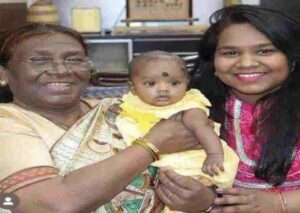 |
| Family -Son (Died ) | Draupadi’s Son Lakshman and Sipun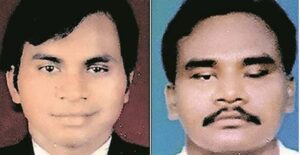 |
| Family -Husband (Died) | Murumu-Husband-shyam-charan-murmu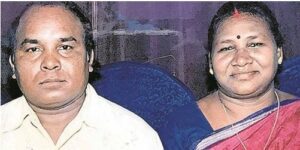 |
| Family -Draupadi Murmu’s husband and son memorial | Draupadi Murmu’s husband and son memorial 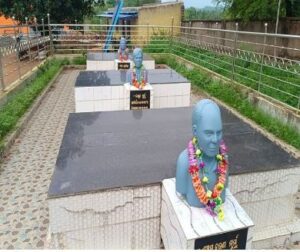 |
| Height | 5 Feet 5 Inch |
| Eye | Black |
| Hair | Black |
| Signature |  |
Droupadi Murmu was born to a Santali family on 20 June 1958, in Uparbeda village in the Baidaposi area of Rairangpur, Odisha.Her father Biranchi Narayan Tudu was a farmer. Her father and grandfather were traditional heads (designated Sarpanch) of the village council (Gram Panchayat). Her family named her Puti Tudu. She was renamed by her school teacher to Droupadi, and her name was changed several times to those including Durpadi and Dorpdi in the past.
Murmu studied elementary education at the local primary school in Uparbeda. At age five, she moved to Bhubaneswar for higher studies.She completed secondary education from Girl’s High School Unit-2, and graduated in B.A. from Rama Devi Women’s College.
She married Shyam Charan Murmu, a banker,in 1980 with whom she had two sons and a daughter. Her husband, two sons, mother, and a brother all died in a span of 7 years, from 2009 to 2015. She is a follower of the Brahma Kumaris spiritual movement.
Early career
From 1979 to 1983, Murmu worked as a junior assistant at the irrigation department of the Government of Odisha. From 1994 to 1997, she then worked as a teacher at the school Sri Aurobindo Integral Education and Research Centre in Rairangpur, where she taught Hindi, Odia, Maths and Geography. She never claimed for a full salary at the school.
Political career
In 1997, Droupadi Murmu was elected as the councillor of the Rairangpur Nagar Panchayat as an independent candidate from a reserved seat for women. She then joined the Bharatiya Janata Party (BJP).
She won the 2000 Odisha Legislative Assembly election from Rairangpur Assembly constituency and served two terms in the Odisha Legislative Assembly between 2000 and 2009. During the BJP and BJD coalition government in Odisha, she was the Minister of State with Independent Charge for Commerce and Transportation from 6 March 2000 to 6 August 2002, and Fisheries and Animal Resources Development from 6 August 2002 to 16 May 2004.
In 2007, she received the Nilkanth Award for the Best MLA of the Odisha Legislative Assembly.[20] In 2009, she lost the Lok Sabha election from Mayurbhanj Lok Sabha constituency as the BJD and BJP alliance had ended. She was elected to the BJP National Executive (ST Morcha) in 2013, and was the district president until 2015.
Governor of Jharkhand (2015–2021)
Governor Murmu with Prime Minister Narendra Modi in 2015
Murmu was sworn in as the Governor of Jharkhand on 18 May 2015, becoming the first woman to hold the position. The BJP was in power in the Jharkhand Government for most of her six-year tenure as a governor and was also in power in the Union Government throughout her tenure. She administered the oath of office to Hemant Soren as Chief Minister of Jharkhand in 2019.
Ratan Tirkey, a former BJP politician and activist, said that Murmu had not done enough to make sure that the self-governance rights granted to tribal communities were properly implemented. These rights were granted under the Fifth Schedule and the Panchayats (Extension to Scheduled Areas) Act, 1996 or PESA. Tirkey said, “Despite several requests, the then governor never exercised her powers to implement the Fifth Schedule provisions and Pesa in letter and spirit”.
Her six-year tenure as Governor began in May 2015 and ended in July 2021.
Pathalgadi movement
Main article: Pathalgadi movement
In 2016–2017, the Raghubar Das ministry was seeking amendments to the Chhotanagpur Tenancy Act, 1908, and the Santhal Pargana Tenancy Act, 1949. These two original laws had safeguarded the rights of tribal communities on their land. According to the existing laws, land transactions could only be done between tribal communities. The new amendments gave the tribals the right to allow the government to make commercial use of tribal land and to take tribal land on lease. The proposed bill amending the existing law had been approved by the Jharkhand Legislative Assembly. The bills were sent to Murmu for approval in November 2016.
The tribal people had strongly objected to the proposed law. During the Pathalgadi movement, protests were held against the proposed amendments to the tenancy acts. In one incident, the protest turned violent and the tribals abducted the security detail of the BJP Member of Parliament Karia Munda. Police responded with a violent crack-down on tribal communities, that caused the death of a tribal man. Criminal cases were filed against more than 200 people including the tribal rights activist Stan Swamy. Murmu was criticized for her soft stand on police aggression against tribal communities during the movement. According to woman tribal rights activist Aloka Kujur she was expected to speak up to the government in support of the tribals but this did not happen, and instead she appealed to the Pathalgarhi agitation leaders to repose faith in the constitution.[22]
Murmu had received total of 192 memorandums against the amendments in the bill. Then opposition leader Hemant Soren had said that the BJP government wanted to acquire tribal land through the two amendment Bills for the benefit of corporates. Opposition parties Jharkhand Mukti Morcha, the Indian National Congress, the Jharkhand Vikas Morcha and others had put intense pressure against the bill. On 24 May 2017, Murmu relented and refused to give assent to the bills and returned the bill to the state government along with the memorandums she had received. The bill was later withdrawn in August 2017.
Religion and land bill
In 2017, she approved the Freedom of Religion Bill, 2017, and the bill to amend the Land Acquisition 2013 Act passed by the Jharkhand Assembly.
The new religion bill makes it an offence subject to a penalty of three years in prison, to coerce or lure a person to convert their religion. If the person coerced is a member of a Scheduled Caste or tribe, a minor, or female, the prison term increases to four years. Fines can be levied in any case. The bill also made it mandatory for voluntary converts, to inform the Deputy Commissioner about their conversion, and to give full details about the circumstances.
The amendments in the Land Acquisition Act, 2013, involved changes in the compensation duration and requirements for social impacts assessment. According to the passed law, monetary compensation for government acquisition of tribal land must be paid within six months of acquisition. The requirement for social impact assessments was dropped for some types of infrastructure projects.
Presidential campaign
Main article: 2022 Indian presidential election
In June 2022, the BJP nominated Murmu as the National Democratic Alliance (NDA)’s candidate for President of India for the 2022 election the following month. Yashwant Sinha, was nominated as the candidate for president by the opposition parties. During her election campaign, Murmu visited various states seeking support for her candidature. Several opposition parties like BJD, YSRCP, JMM, BSP, SS, JD(S) among others had announced support for her candidature prior to polling. On 21 July 2022, Murmu secured a clear majority in the 2022 Presidential election defeating common opposition candidate Yashwant Sinha with 676,803 electoral votes (64.03% of total) in 21 of the 28 states (including in the union territory of Puducherry) to become the 15th President of India.
Presidency (2022–present)
Main article: Presidency of Droupadi Murmu
Chief Justice N. V. Ramana administering the oath of the office to President-elect Murmu
On 26 July 2022, Droupadi Murmu took oath as the 15th President of India, oath of which was administered by the 48th Chief Justice of India N. V. Ramana in the presence of former Presidents, Vice President, Prime Minister and other delegates.
She is the first person from India’s designated tribal communities to be elected president.She is the youngest and first individual born after India’s independence in 1947 to have been elected president. Murmu is only the second woman after Pratibha Patil to serve as President of India.
Murmu speaking before the 75th Independence Day, August 2022
Murmu addressed the nation for the first time as the President of India, on 14 August 2022, Independence day eve. She greeted the citizens of the country on the 75th Independence.
In September 2022, she launched a government program ‘Pradhanmantri TB mukht Bharat’ – an initiative to eradicate Tuberculosis from the country. She became the first ever President of India, to inaugurate the ‘Mysuru Dasara’ a 10-day state festival in Karnataka. In the initial months, Murmu paid vast visits to the north-eastern states of the country including Assam, Mizoram, Nagaland and Sikkim and engaged in ceremonies of various development projects.
In November 2022, she paid her first visit to her home state Odisha after assuming the office of the President, to participate in the launch of various programmes. During this visit she visited her alma mater school and later interacted with school children along the sideways of the road and walked 2 kilometers to pay obeisance to the deities of Puri Jagannath Temple.
Oath Ceremony
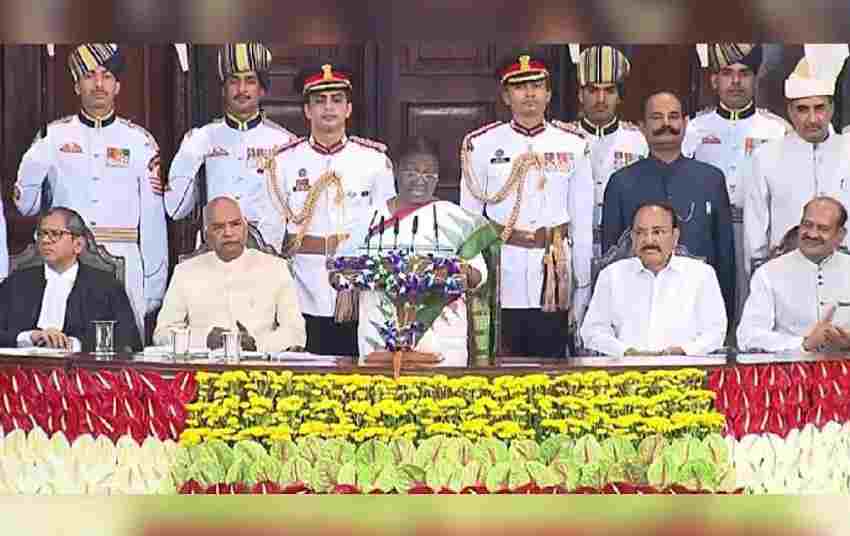
- In the oath ceremony of Draupadi Murmu, she said that “This is not only my achievement. It is the achievement of all the poor in the country. The poor can dare to dream now.” Draupadi Murmu on Monday was sworn in as 15th President of India at the Central Hall of the Parliament in New Delhi followed by a 21-gun salute. “Your faith in me has given me strength. I have got this responsibility at such an important time as it is India’s 75 years of Independence. I am also the first President to be born after India got its Independence,” said President Murmu in her first address, while adding, “This is not only my achievement. It is the achievement of all the poor in the country. The poor can dare to dream now. With their blessings and the support of the mothers and daughters of the country I am standing here in front of you now.” Murmu, 64, is also India’s youngest President.
- On Thursday, Murmu had scripted history by becoming the first person from the tribal community to occupy India’s top constitutional post after she bagged 64% votes of the electoral college to defeat Opposition candidate Yashwant Sinha. She got 2824 first preference votes, valued at 6,76,803 votes, while Sinha had only managed to get 1,877 first preference votes, valued at 3,80,177.
- Rajasthan CM Ashok Gehlot said that he was left ‘impressed’ by president Draupadi Murmu’s words.
- As Draupadi Murmu took oath as India’s 15th President, PM Narendra Modi called it a “watershed moment for the poor, the marginalized, and the downtrodden.”
- Draupadi Murmu also said that her name was changed by her teacher.
- Former Jammu and Kashmir Chief Minister Mehbooba Mufti slammed Ram Nath Kovind, saying the “outgoing president leaves behind a legacy where the Indian Constitution was trampled upon umpteenth times.”
- After the conclusion of the ceremony, President Draupadi Murmu greets PM Narendra Modi, Union Ministers, Congress interim president Sonia Gandhi, Chief Minister, and other dignitaries at the Central Hall of the Parliament.
- Draupadi Murmu pays tribute to the Samadhi of Mahatma Gandhi at Raj Ghat in Delhi.
- Murmu is the second President of Odisha, after V.V. Giri, who served as the fourth President of India from 1969 to 1974.
- Draupadi Murmu is the 10th successive president to take oath on July 25 since 1977. Records show that since 1977, successive presidents have taken oath on 25. Neelam Sanjiv Reddy, the sixth president of India, took oath on July 25, 1977. Since then, successive presidents, including Giani Zail Singh, R Venkataraman, Shankar Dayal Sharma, K R Narayanan, APJ Abdul Kalam, Pratibha Patil, Pranab Mukherjee, and Ram Nath Kovind have taken oath on July 25.
- President of China Xi Jinping congratulated Draupadi Murmu and also pointed out that China and India are important neighbours of each other, and that a healthy and stable China-India relationship is in line with the fundamental interests of the two countries and their people, as well as conducive to peace, stability, and development in the region and across the world.
- Xi said that he attaches great importance to China-India relations, and stands ready to work with Murmu to enhance political mutual trust, deepen practical cooperation, properly handle differences and push bilateral ties forward on the right track, state-run Xinhua news agency reported.
Perks Enjoyed By The President Of India
- The Rashtrapati Bhavan, one of the largest presidential palaces in the world, is home to the president of India. The president would be living in a sprawling 330-acre construction with a built-up area of 200,000 sq ft divided into 340 rooms in a single-story building, with an enormous library and an attached spacious reading space.
- The president has the presidential palace with massive stables and a remarkable collection of horses, a set of hospitals, a giant golf course, and the famous Mughal gardens along with four other variations of stunningly decorated gardens.
- To take care of the president and the Rashtrapati Bhavan, he /she is provided with a staff of hundreds.
- The president is also entitled to two equally lavish holiday retreats. One is the Rashtrapati Nilayam in Hyderabad, and the other is the retreat building in Shimla.
- The president is given a stunning Black Mercedes Benz S600 (W221) Pullman guard and a custom-built heavily armored stretch limousine for his/her official visits.
- The president also receives other allowances, which include free medical, housing, and treatment facilities for life.
- The president’s Bodyguard (PBG) provides security for India’s president. PBG is not only the most senior but also the oldest unit in the Indian Army. It serves as a ceremonial unit during peacetime but can also be deployed during wartime as they are trained paratroopers.
- The president of India draws a salary of 5lakh approximately per month.
- After retirement, the president of India is entitled to numerous benefits. Some of them are a pension of 1.5 lakh per month, one fully furnished and rent-free bungalow, and free train or air travel with a companion.
Top 13 Facts About Draupadi Murmu
- Draupadi Murmu is the first woman to hold the post of governor of Jharkhand.
- She was also the first tribal woman to become the full-time governor of any Indian state.
- If elected as the president of India, Draupadi Murmu will be the first one from the tribal community to hold the top post.
- If elected, she will also be the first pod India who was born after independence. She didn’t have her own house till 2009.
- BJP announced Murmu’s name as the NDA candidate for the presidential election.
- Draupadi Murmu was appointed the governor of Jharkhand.
- Draupadi Murmu was appointed the president of BJP schedule Tribe Morcha, Odisha unit.
- She was again elected as an MLA from the same Rairangpur constituency on a BJP ticket.
- She was appointed as a M.O.S for fisheries and animal husbandry in the Odisha state government. She remained in the office until 2004.
- The year 1997 marked the beginning of Draupadi Murmu’s political career when she was elected to serve as a councilor for the Rairangpur’s vice chairperson. Her tenure there lasted for one year.
- Following her victory in the assembly elections held in the Rairangpur seat in 2004, she was subsequently elected to a ministerial position in the BJP party. She began working at the department of transport, trade, fisheries, and animal husbandry in 2000, and she remained employed there until 2004.
- She was victorious in the assembly elections in 2004, and this time she was chosen to represent the BJP in the Rairangpur seat.
- In 2006, she won the election to serve as the state’s president of the BJP scheduled Tribe morcha and the district president of the BJP in Mayurbhanj. Between the years 2006 and 2009, she held the position
- She was chosen to serve as the ninth governor of Jharkhand in May 2015 and remained in that position until May 2021.
- She was nominated by the Bhartiya Janata Party (BJP) to run for the presidency of India in the year 2022 elections.
- Draupadi Murmu runs a school where she gives free-of-cost education to the Adivasis people, or we can say, tribal people.
- Draupadi Murmu is a vegetarian.
- Draupadi taught in the school without taking a salary. She also gave chocolates to the students as a reward.
- Two books-moods, moments, and memories have a visual history of the former president of India from 1950-2017, and the other one titled ‘The First Citizen’, has a pictorial record of president kovind’s term. The third book ‘Interpreting Geometries- Flooring of Rashtrapati Bhavan ‘, is a unique repository of flooring patterns designed by Sir Edwin Lutyens for the abode of the Viceroy of India in 1912.









